Posts Tagged ‘Dallas climate plan’
Urge the Dallas Council To Restore the Environmental Health Commission on May 27th
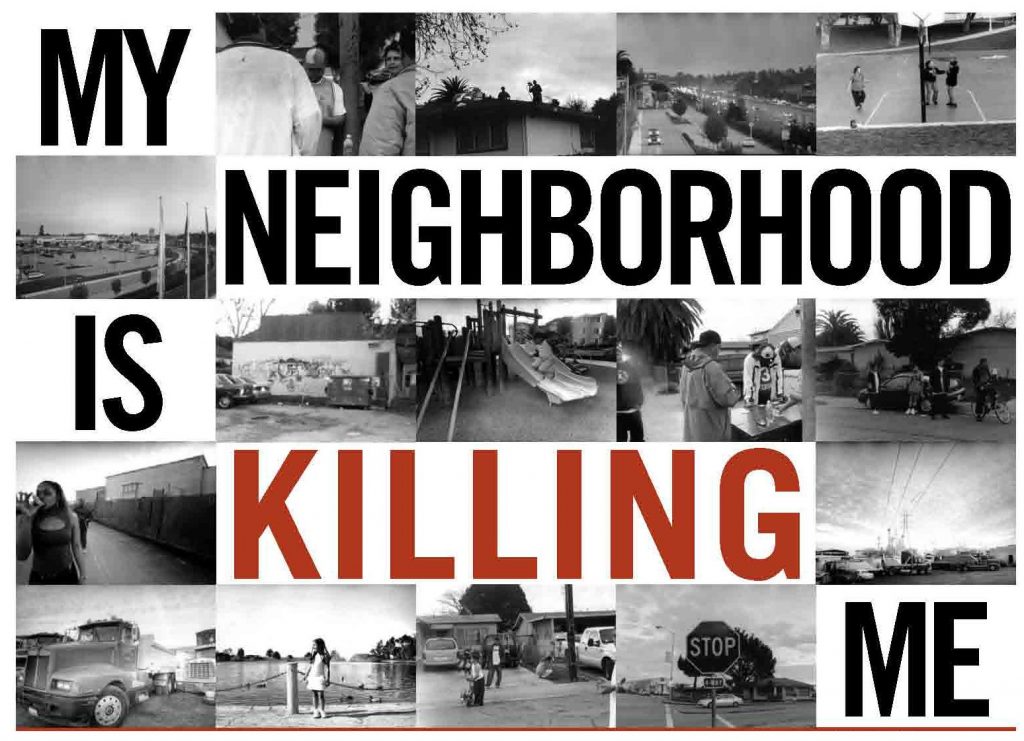
CLICK HERE TO SEND AN EMAIL RIGHT NOW. YOU CAN ADD YOUR OWN COMMENTS
For over a year Southern Sector Rising has been lobbying the City Council for the restoration of the Dallas Environmental Health Commission. With the adoption of the City’s Climate Plan, the Council has a chance to do that next Wednesday , May 27th. But they must hear from you.
Opposition is coming from management in the Office of Environmental Quality and Sustainability who don’t want the word “health” used for this new body. Why? Because this is the same city staff who doesn’t want to responsibility of telling citizens they have bad air or are living too close to industry. Houston has a staff toxicologist advising City Hall. Dallas has a lawyer.
This is why residents must have the Dallas Environmental Health Commission. It serves as a citizen-friendly forum for putting environmental health issues on the official City Hall radar and generates important new public policy proposals. Every Council Member would appoint a member and various experts would serve as advisors. It would instantly elevate the status of Environmental Health at Dallas City Hall.
You can help make this happen by sending a quick “ClickNSend” email to Mayor Johnson and the City Council urging them to vote for a new Dallas Environmental Health Commission. You can add your own comments as well. It takes all of 30 to 60 seconds, and it could mean the difference between Dallas and the next Shingle Mountain.
HERE’S THE LINK TO SEND YOUR EMAIL TO THE MAYOR AND COUNCIL https://www.downwindersatrisk.org/featured-citizen-action/
Thank you.
Dallas’ Climate Plan Rolls Out Public Engagement Plan. Public is MIA.

They had the PowerPoints. They had the hardcopies of the PowerPoints in Spanish. They had the Subject Boards. They had the Post It notes and purple dots. Lots of purple dots. They had staff. They had consultants. They had consultants hired by consultants.
All in all, Dallas City Hall had everything it thought it needed for its very first of six climate plan public engagement meetings…save the public itself.
Of the 23 people in attendance on April 29th at the Beckley Saner Rec Center, only three were members of “the public.” Staff and consultants outnumbered them a good five to six to one with the rest being members of the City Climate Plan’s handpicked “Stakeholders Group.”
And even that group was not a safe bet. One Stakeholder came armed with a flier complaining that the City had made “no promise your voice or ideas will actually be heard” while another wondered why there were being asked to attend. That was a easy question. To help fill seats.
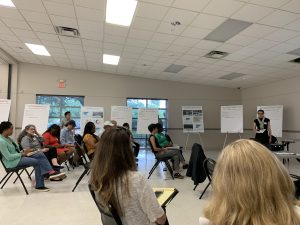
Looks can be deceiving. There were only two members of the public at the first climate plan public meeting. Everyone else in this picture is staff or Stakeholders.
It wasn’t a very auspicious beginning to the public interface phase of the city’s climate plan process. It’ll be interesting to see how much the city gets billed by the professional PR experts to generate less than a Poker game’s worth of participants.
That result prompted a memo which produced wave upon wave of new social media reminders about the great opportunity to attend the next five meetings from everyone at City Hall including, council members, Dallas Mayor Mike Rawlings to DART board members. That push was successful in tripling the size of the April 30th and May 2nd meetings to nine members of the public. But there hasn’t been a meeting yet where the public made-up a majority of those in attendance.
Maybe word got out about the, er, circumscribed nature of the “engagement” meetings. You arrive to find the categories for responses have already been defined by staff on big white boards surrounding the room. There’s “Buildings and Energy,” “Food and Urban Agriculture,” “Parks and Open Spaces,” “Solid Waste,” “The Water We Use,” and “Transportation.”
These follow the format of the online survey the City is pimping.
Missing are topics like “Air Quality,” “Flood Control,” “Zoning” and “Industry.”
Under each of these broad subject titles are exactly six prompted policy options already proposed by staff. Not five, or seven, always six. And they’re far from comprehensive. For example, despite the worldwide wave of electric bus fleet electrification (Paris just ordered 800 e-buses), that policy option is nowhere to be found on the Transportation Board. If you’re aware of that trend you can record a write-in vote for it but it’s not presented to the general public as an obvious climate change policy, which it most certainly is.
Otherwise, your job is to place purple dots by the policy options already outlined for you by City Hall staff.
This is after you get a 30-minute Dallas staff PowerPoint primer on climate change that tells most people showing up for this meeting what they already know. There’s never any opportunity for a back and forth discussion among participants or true brainstorming as a group about local remedies. You watch the PowerPoint, pick among the already chosen policy options on the big boards, or write your own suggestions in, and then….go home. This is the staff’s definition of “public engagement.”
Setting the tone-deaf basis for these public engagement meetings was the much ballyhooed “Town Hall” at this year’s Fair Park’s EarthX event, which was really just one looooong lecture. There you could immerse yourself in 45 minutes of staff talking at you about how great staff and Dallas had been doing so far. Want to ask questions about the process? No time. It was less a “town hall” than a “city closet.”
A good fifth or fourth of the Town Hall audience were Stakeholders already chosen by the city staff to participate in a sort of overview of what’s going on. These are the same Chosen Few who were asked to please show up at the public engagement meetings. There is no public listing of who’s in the group – it’s not there on the City’s website or anywhere else, but it looks to include all the usual suspects we predicted it would plus a few others. There’s also not a meeting schedule for the group or an indication whether the public is allowed to attend.
In fact, the City’s climate plan website is kind of a hot mess, full of 404 error messages and empty white space where details of the process should be housed. A question on the site’s “forum” asking about Stakeholder membership has gone unanswered for 6 days now. It’s “blog” is empty of posts. Like the process itself, it seems mostly for show and to serve as a funnel to take the city’s survey.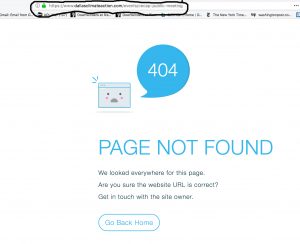
Official Stakeholders are sometimes asked to identify themselves in the meetings, but never actually introduce themselves to the public. They’re supposed to be a combination of business, government, and environmental group representatives but since there’s no listing of them, it’s hard to tell how representative they really are. During their first group meeting, the guy from the Trump EPA reportedly looked around the room and commented how “white the group was.” Not a good sign.
Nor do they seem to have much opportunity for real input. Stakeholders complained at the April 29th meeting that either that they hadn’t been asked to provide suggestions for the City’s survey and meeting format or the ones they’d offered were ignored.
So far, they’ve mostly served the purpose of filling out the very thin public presence at each of the City’s official climate plan events and being a PR backstop for staff to proclaim how inclusive they’re being.
We hate to say we told you so, but we really did.
There are three more city “public engagement” meetings scheduled if you want to assess the process for yourself:
MONDAY, MAY 6
Churchill Rec Center
6906 Churchill Way
6:00 – 8:00 p.m.
TUESDAY, MAY 7
Audelia Rd Library
10045 Audelia Rd
6:00 – 8:00 p.m.
THURSDAY, MAY 9
Eastfield College- Pleasant Grove
802 S. Buckner Rd,
6:00 – 8:00 p.m
Dallas Climate Plan’s “Public Participation” is Neither Very Public nor Participatory
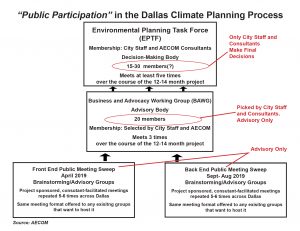
Despite supporters’ claims that the new $500,000 Dallas Climate “Action” Plan would have lots of opportunities for public participation, the decision-making apparatus drafting the plan puts all the decision-making power in the hands of City staff and its hired consultants.
Meet the New Boss. Same as the Old Boss.
Oh, they’ll be countless PowerPoint presentations and “brain storming” sessions around the city over the next year in meetings sponsored by City Hall and neighborhood associations, but those will have exactly zero official standing in the final plan. Suggestions and comments will be harvested but they don’t have to be included – not even if they’re extremely popular in all those meetings.
Those community meetings are the foundation for the process AECOM consultants outlined at the City’s Climate Symposium on February 4th. They’re at the very bottom of the plan’s purported decision-making pyramid. This MO is familiar to anyone dealing with Dallas City Hall in the recent past: “We’re happy to give you all the well-publicized public meetings you want. Just don’t ask us to let the public in the room when the actual decisions are being made.”
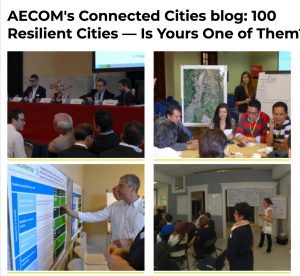 To maintain the illusion of someone other than city staff and consultants being involved, there’s a 20 member “Business and Advocacy Working Group, or “BAWG” (pronounced like the noun describing the soft ground formed by decaying plants, but also like the British slang term for a toilet, as in “Do you have any Bog/BAWG paper? We ran out.” Either metaphor is probably apt here.)
To maintain the illusion of someone other than city staff and consultants being involved, there’s a 20 member “Business and Advocacy Working Group, or “BAWG” (pronounced like the noun describing the soft ground formed by decaying plants, but also like the British slang term for a toilet, as in “Do you have any Bog/BAWG paper? We ran out.” Either metaphor is probably apt here.)
This august body will be, let’s see, what was the very civilized term used by the AECOM consultant at the Symposium? “Curated,” that’s it. The BAWG members will be “curated” by city staff and AECOM. We thought that was such a precious term for “hand-picked by the Powers-That-Be.”
So City Hall and AECOM will hand pick the 20 members of this working group, at least half of whom will be Dallas “Bidness” folk. That leaves 10 or less slots for “advocates” like the Texas Tree Foundation, the Texas Nature Conservancy, and other City Hall friendly-groups who are allies or have the blessing of Dallas (Rockefeller) “Resilency” Czarina Theresa O’Donnell. Of course O’Donnell proved her green bone fides earlier this decade when she passionately defended the idea of drilling for gas in Dallas public parks.
Despite other cities singling-out “equity” concerns for their own tracks, there’s absolutely official zero intent in the Dallas Office of Environmental Quality and (Rockefeller) Sustainability to do so here. Not even after going around the last six months proclaiming how concerned City Hall was about black kids with asthma. Local environmental justice advocates approached the OEQ(R)S last month with the idea of establishing an “equity working group” as part of the public participation process. They were told the City wasn’t interested.
Remaining remarkably consistent with their current management philosophy city staff dismissed the idea that more Dallas residents being involved in the planning process was a good thing. When the EJ groups brought up the recently-completed San Antonio plan which established not only a business-environmentalist steering committee but working groups on “Energy and Buildings,” “Transportation and Land Use,” “Solid Waste Resources, ” Water and Natural Resources,” and “Equity,” staff responded that San Antonio City Hall had warned them to avoid all that democracy. “There were too many people involved down there” was the reply, which will surely come as a surprise to the 86 San Antonio activists who participated.
Despite all this official gate-keeping surrounding the Climate Plan’s BAWG/BOG membership in Dallas, the actual on-the-paper influence of this curated working group is questionable since it only meets 3 times over the course of the year long drafting process. For most of those 12 months this “working group” is unemployed.
Which brings us to the real decision-makers at the top of the pyramid, the “Environmental Planning Task Force, or “EPTF.” Gesundheit!
Comprised exclusively of city staffers and consultants, this Task Force will oversee the day-to-day machinations of the climate plan, and most importantly what recommendations to include, or not, and what timelines are “realistic” vs “not practical.” While there’s a patina of public participation in its “listening tours” the final arbiters of Dallas’ climate plan remain completely removed from public transparency, accountability and meaningful participation.
It didn’t have to be this way, at least not without a fight.
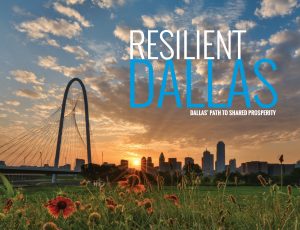 The same mainstream green groups that signed-off on City Hall using Dallas’ moribund plastic bag fund to pay for this plan could have demanded authentic public participation in return for their support. They could have asked for Southern Sector groups to have their fair share of representation at the table. They could have requested multiple resident-staffed working groups like San Antonio. They could have asked for real oversight and decision-making. Dallas City Hall needed them and their lobbying last August during the budget town hall meetings, but they gave up their leverage without asking for anything in return (that we know about anyway). This current public participation plan that really isn’t, is the result.
The same mainstream green groups that signed-off on City Hall using Dallas’ moribund plastic bag fund to pay for this plan could have demanded authentic public participation in return for their support. They could have asked for Southern Sector groups to have their fair share of representation at the table. They could have requested multiple resident-staffed working groups like San Antonio. They could have asked for real oversight and decision-making. Dallas City Hall needed them and their lobbying last August during the budget town hall meetings, but they gave up their leverage without asking for anything in return (that we know about anyway). This current public participation plan that really isn’t, is the result.
As we noted in our last post about this subject, perhaps the only good thing about this process is that’s it gives Dallas residents a chance to upset the cart with their own ideas about how a climate plan for the city should be assembled. There’s already rumblings about a citizens’ planning process to shadow the staff’s version and provide an honest measuring stick for it. That would be a good idea. Unlike city staff, Downwinders believes the more people in the room, the better the decisions being made.
